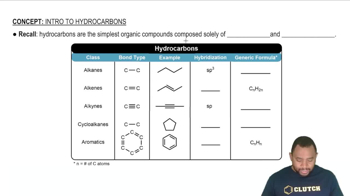Textbook Question
Write the condensed structure for the straight-chain alkanes shown:
(b) methane
1492
views

 Verified step by step guidance
Verified step by step guidance



Write the condensed structure for the straight-chain alkanes shown:
(b) methane
Write the condensed structure for the straight-chain alkanes shown:
(c) hexane
Write the skeletal structure for the alkane or cycloalkane shown:
(c) CH3CH2CH2CH2CH2CH2CH2CH3
Identify the family of hydrocarbon present in the following:
(c)
Identify the family of hydrocarbon present in the following:
(a) CH3CH2CH=CH2
Identify all the functional groups present in the following:
(a)